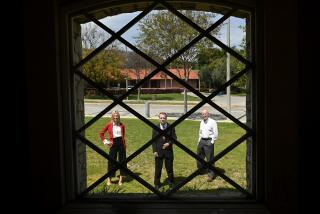Arbitrator Favors Contractor Over Homeowners in Dispute
- Share via
SIMI VALLEY — A local condominium homeowners association has lost an arbitrator’s ruling to a Santa Barbara contractor who claimed that the association reneged on a deal to pay for repairs after the 1994 Northridge earthquake.
The American Arbitration Assn. ruled Wednesday that the Le Parc Homeowners Assn. must pay QwikResponse of Santa Barbara $6.6 million in damages. The contractor alleged that the association tried to restructure the repair contract after work was begun, interfered in agreements between the contractor and subcontractors and knowingly tried to destroy the business by diverting funds and slandering QwikResponse owner D. Darren Zuzow.
“My client is very pleased by the judgment, but he wishes he would never have had to go through this in the first place,” said Glenn Campbell, the attorney who represented Zuzow in the arbitration.
Lawyers representing Le Parc criticized the judgment as excessive and said their clients had reason to question the contractor’s work.
“They took issue with the quality of work and how the money was being spent,” said David Worley, the attorney who represented the homeowners association. “And they still feel the same way.”
Though Zuzow and his company won the case, it is unlikely he will see any money soon. The decision must still be certified by a Superior Court judge and, according to Worley, the association is bankrupt and cannot pay the judgment.
“It’s still a ways from being settled,” he said.
According to lawyers for the two parties, the Le Parc Homeowners Assn. awarded QwikResponse a $6-million contract in June 1994 to repair earthquake damage to the 264-unit complex.
However, after the association voted in a new board of directors in April 1995, the problems began. The association stopped paying QwikResponse, citing concerns that the contractor’s work was substandard and that subcontractors were not being paid.
Campbell said the board slandered his client and the business by implying that money was being improperly spent and that the work was deficient.
“It was a very strange and uncomfortable situation for my client,” Campbell said. “Eventually it got to a point where the work had to be stopped.”
QwikResponse suspended work in January 1996 after repairing only 88 of the 264 units.
However, Worley maintained that the association acted in the best interest of homeowners and was justified in questioning how a million-dollar down payment was being spent and if the contractor was operating within the boundaries of the law.
“There were some questions as to how business was being conducted,” he said. “And the answer they received was less than satisfactory.”
More to Read
Sign up for Essential California
The most important California stories and recommendations in your inbox every morning.
You may occasionally receive promotional content from the Los Angeles Times.













